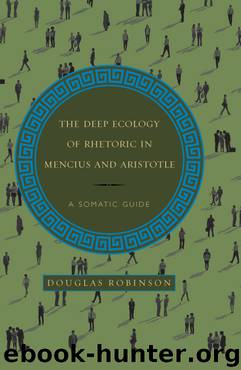The Deep Ecology of Rhetoric in Mencius and Aristotle by Robinson Douglas

Author:Robinson, Douglas
Language: eng
Format: epub
Publisher: State University of New York Press
Published: 2015-03-13T16:00:00+00:00
4.2 Aristotle/Mencius: doxa/wén 聞 as Feeling-Becoming-Thinking
If we can provisionally agree, then, that doxa/wén 聞 is a kind of collective/circulatory hearing-the-news/opinion-becoming-reputation entelechy—members of Group A circulating (telling/hearing) opinions of Individual B until they begin to emerge icotically (becoming-persuasively) as Individual B’s reputation—what is it? Is it a belief or belief system that is exclusively, primarily, typically, or conceivably expressed verbally as a proposition or series of propositions? If so, what is the difference between a belief that is typically expressed as a proposition and a belief that only might be expressed as a proposition? For surely there is a difference? Just how propositional is an opinion that exists mainly as a vague inclination that might, in the right hands, be converted into a proposition? This is an important question, it seems to me, precisely because vague inclinations would seem to be more susceptible to the kind of collective “occupation” of a group mind than conscious propositional beliefs.
Try this: imagine a friend, an actual friend of yours. Now imagine how you feel about him or her, and how the other members of your group feel about him or her. What differences are there in the opinion-becoming-reputation kind of feelings you and your friends harbor about this person? Or, to run that the other way, what level of dispositional or inclinational generality would you need to move to in order to iron out all the differences in how people in your group feel about this friend? For example, isn’t it more likely for everyone in the group to agree that s/he is a “good” person than that s/he is a “trustworthy” person, and more likely for them to agree, further, that s/he is a “trustworthy” person than, say, that s/he is the best person to have with you in a family crisis? The more propositional specificity you want to add to the shared opinion-becoming-reputation type of feeling about your friend, I suggest, the harder it is going to be to get everyone in the group to agree. And, conversely, the longer the opinion-becoming-reputation orientations remain unstated, unspecified, at the level of inchoate affective/evaluative “up or down” inclinations—good or bad, positive or negative, smiles or frowns, hugs or cold shoulders—the more likely they are to be shared by the whole group. Just try and get your friends together to write down a list of characteristics of this person that everyone can agree on. Articulation of group opinions inevitably breeds disagreement. Better to leave the list unspecified, preconscious, felt.
Or take fame, another common translation of both doxa and wén 聞. What is the propositional content of fame? There isn’t one. The opinions that constitute reputation can be reduced to propositions: X is a good person, honorable, upright, reliable, etc. Reputation, we might say, is opinion-as-feeling in motion toward opinion-as-thinking. But try to reduce fame to propositions. It can’t be done. We can say that Yo Yo Ma (马友友) is a brilliant cellist, but that doesn’t reduce his fame to a proposition; it only provides a somewhat inadequate background explanation for it.
Download
This site does not store any files on its server. We only index and link to content provided by other sites. Please contact the content providers to delete copyright contents if any and email us, we'll remove relevant links or contents immediately.
The remains of the day by Kazuo Ishiguro(8970)
Tools of Titans by Timothy Ferriss(8365)
Giovanni's Room by James Baldwin(7326)
The Black Swan by Nassim Nicholas Taleb(7106)
Inner Engineering: A Yogi's Guide to Joy by Sadhguru(6785)
The Way of Zen by Alan W. Watts(6600)
Asking the Right Questions: A Guide to Critical Thinking by M. Neil Browne & Stuart M. Keeley(5758)
The Power of Now: A Guide to Spiritual Enlightenment by Eckhart Tolle(5749)
The Six Wives Of Henry VIII (WOMEN IN HISTORY) by Fraser Antonia(5496)
Astrophysics for People in a Hurry by Neil DeGrasse Tyson(5182)
Housekeeping by Marilynne Robinson(4436)
12 Rules for Life by Jordan B. Peterson(4299)
Double Down (Diary of a Wimpy Kid Book 11) by Jeff Kinney(4261)
Ikigai by Héctor García & Francesc Miralles(4246)
The Ethical Slut by Janet W. Hardy(4242)
Skin in the Game by Nassim Nicholas Taleb(4237)
The Art of Happiness by The Dalai Lama(4125)
Skin in the Game: Hidden Asymmetries in Daily Life by Nassim Nicholas Taleb(3989)
Walking by Henry David Thoreau(3952)
